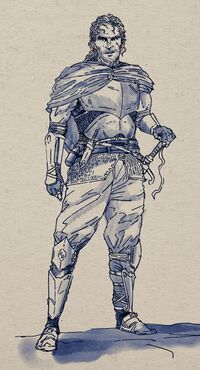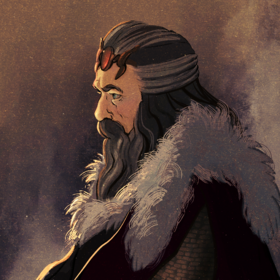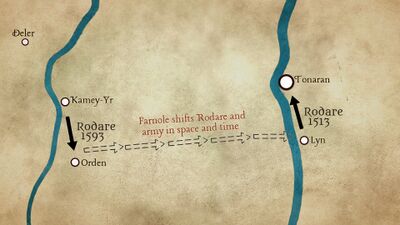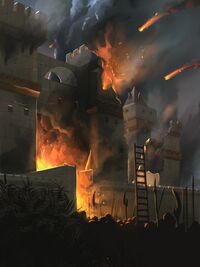Kren Oordar
| Kren Oordar | |
| Head of the Oordar clan Murdoh of Tonaran |
|
|---|---|
| Reign | 1593, then 1513-1543 SR |
| Successor | Kren the Younger |
| Personal details | |
| Born | 1572 SR |
| Died | 1553 SR |
Kren Oordar was the founder of the Oordar clan and the conqueror of Tonaran. He is particularly famous for being part of a causal loop set off by the superhero warrior Farnole, which had his life start in the future, but end in the past.
Kren was born Rodare Oordar to Nilma and Gorōna.
Considered a visionary in his day, Kren projected a fatherly figure as head of the famed Oordars, while Maksag was the Oordar that was regarded as the de-facto ruler of the proto-empire.
Early life
The myth
As Kren was one of the most revered figures of his time, the story of his life was widely known and told, and was written down by several historians, most notably by Davi the Heranian in his "Heran Chronology".
Kren was born in the northern town of Kren under the name Nogsag Oordar to a poor family of fishermen, in the 80s of the 15th CSR. He had an older brother Oron and a younger brother Maksag.
Nogsag soon became known as a fearless warrior, but also a fighter. When he was in his twenties, he defeated a superhero warrior Faron in a fistfight.
In 1513 SR Nogsag and his army conquered Tonaran. Known as "the city that fights gods", Tonaran was considered the ultimate stronghold and had one of the fiercest and feared armies in Heran. Nogsag ending Tonaran's invincibility transformed him into a legend overnight, at the same time providing him with the influence and wealth of Tonaran.
Willing to stress his origins and pay respect to his elders, Nogsag took the name of his hometown Kren. He also had his brother, Maksag, join him at Tonaran. Maksag would then become Jeenor and proceed to lead Oordar armies to expand the rule of the clan all throughout Heran.
This is where the mythological story ends. It has been accepted as generally true for centuries, albeit having a number of obvious embellishments, like Kren winning a fistfight against a superhero warrior.
It is now widely accepted by researchers that Kren Oordar is actually Rodare Oordar, who was sent 80 years into the past by Farnole and had inadvertently become the founder of the clan he came from.
Rodare Oordar

Rodare Oordar was born in 1572 SR to Nilma and Gorōna Oordar. Nilma was the son of Maksag Oordar, brother of Kren.
Rodare was the only son and was raised in Mantar. He then moved to Tonaran with Nilma, who began propping him up to be the successor of Kren the Younger against Pherro, Kren the Younger's brother.
When Hee and Iar suddenly confronted the family in the west by capturing Kamey-Yr and also taking Pherro hostage, Kren the Younger made a decision to exchange Pherro for the city of Orden. Nilma used that decision against Kren the Younger, arguing that this was a sign of weakness and that this would bring the whole family down. Rodare then urged to remove Kren the Younger as leader. The family began gathering at Tonaran to deal with the matter, when Kren the Younger was murdered, possibly on the orders of Nilma himself. As the family convened at Tonaran, Rodare proclaimed himself head of the clan.
Rodare then installed Nilma as king of Mantar, denouncing his mother's title, marking her loss in the power game. Gorōna then had to join her sister in Qep.
Meanwhile, Pherro reacted to Kren the Younger's demise by joining forces with Hee and Iar against Rodare, and Rodare moved out to the west with his army. Hee and Pherro awaited him at Orden, but Rodare led his troops to Kamey-Yr where Iar was stationed. The element of surprise forced Iar's army to flee. Rodare then marched to Orden, but he and his army were inadvertently sent back in time by the superhero warrior Farnole, who thought she was simply vanishing them. Not only that, they all ended up displaced geographically and found themselves on their way to a city south of Tonaran called Lyn.
Unaware of this and having never seen neither Orden nor Lyn before, Rodare began an attack on Lyn, thinking it's Orden, but the city quickly opened its gates. Rodare demanded to see the leaders and found out that the city had a very limited regiment and no signs of Hee, Pherro or their armies.
Believing that they had tricked him in order to regroup with their combined forces at Kamey-Yr, which was politically and economically more important than Orden, Rodare immediately turned his army back. Late at night he approached what he thought was Kamey-Yr in 1593, while in reality it was Tonaran in 1513. The army then attacked Tonaran, which, of course, was not expecting any action. The element of surprise gave Rodare's troops an edge in a difficult battle for the city that lasted for two days. Rodare's army suffered heavy casualties, but came out victorious, ending Tonaran's legendary invincibility and putting the Oordar family on the map for the first time.
During the battle Rodare was seriously wounded and thrown off his horse, when a soldier defended his life, standing over him and fending off attacks. This act of bravery deeply touched Rodare and he said that they shall be brothers forever. The soldier's name was Maksag.
It is not known exactly when Rodare and his soldiers realized what had happened, and it's not clear if they realized the full extent of the situation, since Tonaran looked very differently in the beginning of the 16th CSR.
Multiple records suggest that Rodare must have realized something, since he sent people to Kren where, according to history, should have been the rest of the Oordar family. His messengers, however, came back empty-handed, saying that no one in Kren had ever heard of the Oordar family.
Meanwhile, Rodare's wound became worse and it became clear that he was nearing death. Rodare decided to make Maksag Jeenor, but Maksag, a simple soldier, was worried that his authority would be questioned, since he was an outsider in Heran, having originally come to Tonaran from Kren, a tiny town in the north. Rodare then said that he will take the name "Kren", to ensure that no one questions Maksag's authority or origins. Thus, Rodare Oordar became Kren Oordar and Maksag became Maksag Oordar.
Ernele and Or
After Kren made Maksag Jeenor, Maksag was still worried about his grip on power and knew that with Kren's failing health he did not have much time to make a name for himself. Thus, he began campaigning and marched the new Oordar army on Ernele, which swiftly surrendered to the clan. Maksag then took control of the city and immediately began recruiting for his army, in order to grow it even more. At the same time he sent a regiment to Or, which also agreed to the clan's rule. Maksag then led the estimated 80,000 army to the east in order to expand to the Qep region.
Qep
Qep campaign was a major victory for Maksag and the Oordar clan, reaffirming their influence in Heran.
Head of the Oordar clan
Surprisingly enough, Kren eventually survived his battle wound and was able to function as ruler of Tonaran and head of the clan, although his health was poor and he no longer campaigned, leaving that to Maksag.
Kren's survival, coupled with his knowledge of the future, allowed him to expand the Oordar rule, both through political and military means. The subjugation of Mantar, a powerful and independent state, was made possible only by imbuing Maksag with the precise knowledge of how things would unfold.
Since Kren was born in Mantar, his knowledge of western history was scant. This proved to be disastrous in some cases. For instance, Kren remembered that some time during his rule an uprising in Or would occur, but he did not know exactly when. This foreknowledge made Magsag scrutinize Or's Murdohs and increase military presence in the city, which in turn made the situation tense. Thus, it is believed that Kren's knowledge of the uprising at Or is what ultimately triggered it.
Kren passed on the title of head of family to his son in 1543 SR when Kren the Younger turned 12. Just like Maksag, he greatly benefited from Kren's insight into the future, although it seems that Kren never divulged the real source of his wisdom to anyone, not even to Maksag or his son.
Later years
Kren eventually outlived Maksag and died an old man in 1553. His second son, Pherro, was born after his death.
Personality
Kren's personality is uniquely attested to by people from different time periods, and the assessments are generally consistent.
Both as Rodare and later as Kren, he was described as stubborn, condescending and irritable, but able to control his temper. Although difficult to please and difficult to work with, he retained a relatively stable court and preferred to be vocally unhappy with his subordinates and servants, rather than actually acting on his frustrations.
As he grew older, he became more lively, even rowdy and began to indulge in parties and travel.
Throughout his life he was known to be secretive, not only about what later was learned to be the secret of his life, the causal loop, but also about other things. When he traveled, he always traveled in secret and ensured that everyone thought he was somewhere else. He had several children, the fate of which is unknown. He told his only confirmed son, Kren the Younger, that he wanted to ensure that his successor is worthy, and so he eventually chose him out of all his biological children, and that none of them know he is their father. Independent evidence exists that Kren did have several mistresses, although evidence of other children is circumstantial. Kren's second son, Pherro, was born after his death.
Kren's relationship with Maksag was probably the closest in his life. He treated Maksag as his brother and they were never known to have any disagreements. Maksag looked up to Kren as his mentor, but Kren many times voiced his deep admiration for Maksag as a powerful conqueror and leader and frequently joked that Maksag was a more authentic Oordar than him, a joke that could only be fully appreciated by those who knew that Maksag was not, in fact, his real brother.
Due to Kren's unique insight into the future that was uncovered after his death, Kren was thought by some of his contemporaries to be a legendary and for a while this hypothesis was seriously considered until evidence of the causal loop was discovered.
Legacy
Kren Oordar founded what was essentially the first proto-empire of Tarnaria. This set the stage for further centralization of what was historically a very decentralized political landscape. Murdohs, who were usually governors of regions of city-states, were now able to acquire significant scope and power due to the amount of Oordar expansion and the inability of the clan to provide enough family members to rule it all. At the same time, the failure of Kren the Younger to use the momentum of Oordar's influence to centralize the clan's power in Tonaran led to the Oordar proto-empire fall apart almost immediately after Kren the Younger's demise.
Kren's reliance on slave trade and the subsequent invasion and subjugation of Mantar moved slavery to the forefront of Heran economies, possibly reversing the limited social progress advocated by Mantar. In fact, Tonaran, Ernele and Or moved towards less strict laws on slavery, in some cases putting slaves in a better position than peasants, but, partially as punishment for its previous views on slave trade, Mantar turned into a center of slave trade the next 200 years, and became known for its harsh conditions and draconian laws on slavery.
Causal loop discussion
Kren's role
It's not clear how much Kren understood about his own situation, but he most probably did not have enough information to completely grasp what had happened. He positioned himself as a legendary and distanced himself from a specific religious interpretation. Instead, he positioned it as a gift of intuition and a "friendship with fate". Kren believed that he is on a mission to ensure things happen as they should, and had long conversations with others about fate and philosophy, but always in vague terms.
Many signs point to Kren not realizing that he was in a causality loop and that he instead believed himself to be an impostor of the real Kren Oordar, but an impostor who was there to ensure history happens the way he remembered it. He sometimes said that his purpose in life was "to fill the shoes of a great man who was plucked from the world". Given the fact that he did search for the Oordars in the town of Kren and found no traces of the family, he might have thought that he was sent by the Universe to restore history.
His paranoid approach to finding a worthy heir might have been driven by the fact that he did not believe that his son would be the real Kren the Younger, so he wanted to make sure that his son would be capable of at least playing the role of one.
At the same time, he pragmatically instructed Kren the Younger to remove Nilma from power at the first opportunity, whom he wanted to prevent from hurting his son. The only reason he did not suggest Nilma's death was, according to Kren himself, that Nilma was Maksag's son. Some point to this as a sign that Kren must have recognized that Nilma was his father and did not want him dead, but all other evidence points to Kren believing that they were all replacing the original Oordars. For instance, it was Kren who suggested Maksag name his son Nilma. There were also rumors that Kren actually did try to murder Nilma, but was unsuccessful.
First Kren
Historians have struggled with the causal loop, trying to understand if there was ever a first Kren who started it all. However, the nature of causal loops is such that it is impossible to tell which link in the chain was the real beginning.
The only thing that can be said today is that the legend of Kren is unlikely to have ever been true, since the town of Kren never had Oordars. Nor could it ever had - "Oordar" is not a northern name. Similarly, there could have been no Maksag Oordar, since Maksag is a name and a surname. The story acknowledges it by giving Kren the name Nogsag, which would make sense, as Magsag and Nogsag would then have the same surname in the form of the suffix "sag", a common surname in the north. The name of the alleged older brother Oron is not a northern name, which is inconsistent.
No superhero warrior by the name of Faron was documented, but the name "Faron" sounds very similar to "Pherro". The plausibility of this hypothesis is supported by the fact that in the beginning Rodare was searching for Pherro, both in Lyn and then in Tonaran, which he thought was Kamey-Yr. This could have become part of the myth, and the name was transcribed as "Faron".
The mystery of Rodare's army
Rodare Oordar was not the only one who experienced the loop: his whole army was also transported in space and time. No records exist, however, of the effects of the phenomenon on anyone else, which became a mystery, since many suggested that if the causal loop actually happened, all of this people would have been very confused and would have spread the story immediately.
Several explanations have been suggested over the years.
One of them is that the story might have been around, but was never recorded. There is no evidence that Kren had ever divulged his secret to anyone, not even to Maksag or his son. As Kren did not lend it any credibility, it is unlikely that any historian would have written down what sounded like a made up story.
Rodare himself and most of his troops came to Tonaran in 1593 from Mantar. Therefore, all of them were far from home and none of them were likely to know Tonaran, Lyn, Kamey-Yr, Orden or any of its surroundings well, if at all. Both pairs of cities were situated near rivers, in a similar climate. The army visited Kamey-Yr for a brief period of several hours, then proceeding to Orden and came back in the dark. In other words, it is plausible that many soldiers might have not even realized that something was wrong for quite some time.
Finally, Rodare's army suffered heavy losses during the battle of Tonaran, and the surviving soldiers almost immediately joined Maksag to march on Ernele and Or, and then on Qep. It is thus not clear how many people from the original army survived to the end of the Qep campaign in 1515. Even if they were confused and told stories, it is likely there were not too many of them.


